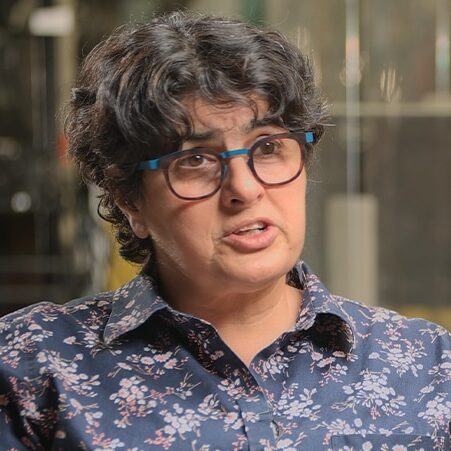
Nergis Mavalvala
Dean of Science, MIT
Nergis Mavalvala is a Pakistani-American astrophysicist who grew up in Karachi, Pakistan. When studying at MIT, she was mentored by Rai Weiss, who encouraged her to persist even when she twice failed her PhD exams. Today she serves as MIT’s first-ever female Dean of Science. She was instrumental in the design of the exquisitely-calibrated pendulum mirrors that bounce LIGO’s lasers along the 4-kilometer-long arms of gravitational detectors in Livingston, LA and Hanford, WA. Nergis is frequently asked how she broke through gender role barriers to pursue a career of her choice. In an interview with the Pakistani newspaper Dawn, Mavalvala states, “I grew up in a family where the stereotypical gender roles were not really observed. So I grew up thinking women can, must and should do anything and everything. That is very important for me.”
Nergis Mavalvala
Nergis Mavalvala attended the Convent of Jesus and Mary, Karachi, where she received her O-Level and A-Level qualifications. She moved to the United States in 1986 and enrolled at Wellesley College, where she received a bachelor’s degree in physics and astronomy in 1990. She then joined Dr. Rainer Weiss’s group in the MIT physics department and received her PhD in 1997. She was a postdoctoral fellow and research scientist at the California Institute of Technology before joining the Physics faculty at MIT in 2002.
She is a longtime member of the scientific team that announced in 2016 the first direct detection of gravitational waves from colliding black holes by the Laser Interferometer Gravitational-wave Observatory (LIGO). The gravitational waves that LIGO detected are ripples in the fabric of spacetime caused by the motion of compact, massive astrophysical objects such as black holes and neutron stars. Since the nature of gravitation is inherently different from electromagnetism, gravitational wave astrophysics provides a radically different window into the universe.
In the quest for ever greater sensitivity in the LIGO detectors, Mavalvala has also conducted pioneering experiments on generation and application of “squeezed states” of light, and on laser cooling and trapping of macroscopic objects to enable observation of quantum phenomena in human-scale systems. LIGO depends on very accurate measurement of light rays bouncing back and forth between mirrors. The accuracy of such measurements is limited by the probabilistic nature of quantum physics, leading to uncertainties in the position of the crests and troughs of light waves. In “squeezed states,” part of Mavalvala’s work, the uncertainties of position of some crests and troughs are reduced, for higher accuracy of measurement, at the expense of greater uncertainty in other crests and troughs.
Mavalvala identifies as lesbian and speaks openly on her sexual orientation and family history as a Pakistani immigrant, describing herself as an “out, queer person of color.” She also speaks about the ability of individuals in Pakistan to break gender roles and stigmas: “Anybody should be able to do those things. And I am proof of that because I am all of those things. With the right combination of opportunity, it was possible for me to do.”
Mavalvala is often viewed as a role model for aspiring female scientists with roots in the Indian subcontinent. As a young child Mavalvala was frequently involved in manual labor, and was not bound to stereotypical gender roles in subcontinent culture, due to the manner in which her sister and she were raised. Mavalvala states that much of her success is accredited to good mentors in both the United States and Pakistan that encouraged her academic ability.
In a television interview in 2016, Mavalvala stated, “When everyone has access to education that’s when all the other things come into place… [You’ve] got to do what gives you pleasure, gotta find a way to do it. People should just do what they enjoy most and I think for all of society whether it’s in Pakistan or elsewhere we have to create opportunities for young girls to do what they’re good at and do what they love to do must cultivate the sense of wonder in a child.” Mavalvala and her partner have two children and reside in Cambridge, Massachusetts in the United States. Mavalvala has extended family in Karachi.
Her awards include the 2018 WINGS Air & Space Award; 2017 National Academy of Sciences Fellow; 2017 Carnegie Corporation’s Great Immigrants Award; 2017 Lahore Technology Award; 2015 Special Breakthrough Prize in Fundamental Physics (as part of the LIGO team); 2014 LGBTQ Scientist of the Year; 2013 Optical Society of America Fellow; 2013 // Joseph F. Keithley Award for Advances in Measurement Science “For seminal contributions to the development and application of quantum metrological methods, in particular of squeezed light sources and optical springs, enabling sensitive measurements beyond the standard quantum limit.”
SOURCES: MIT Profile, Wikipedia















